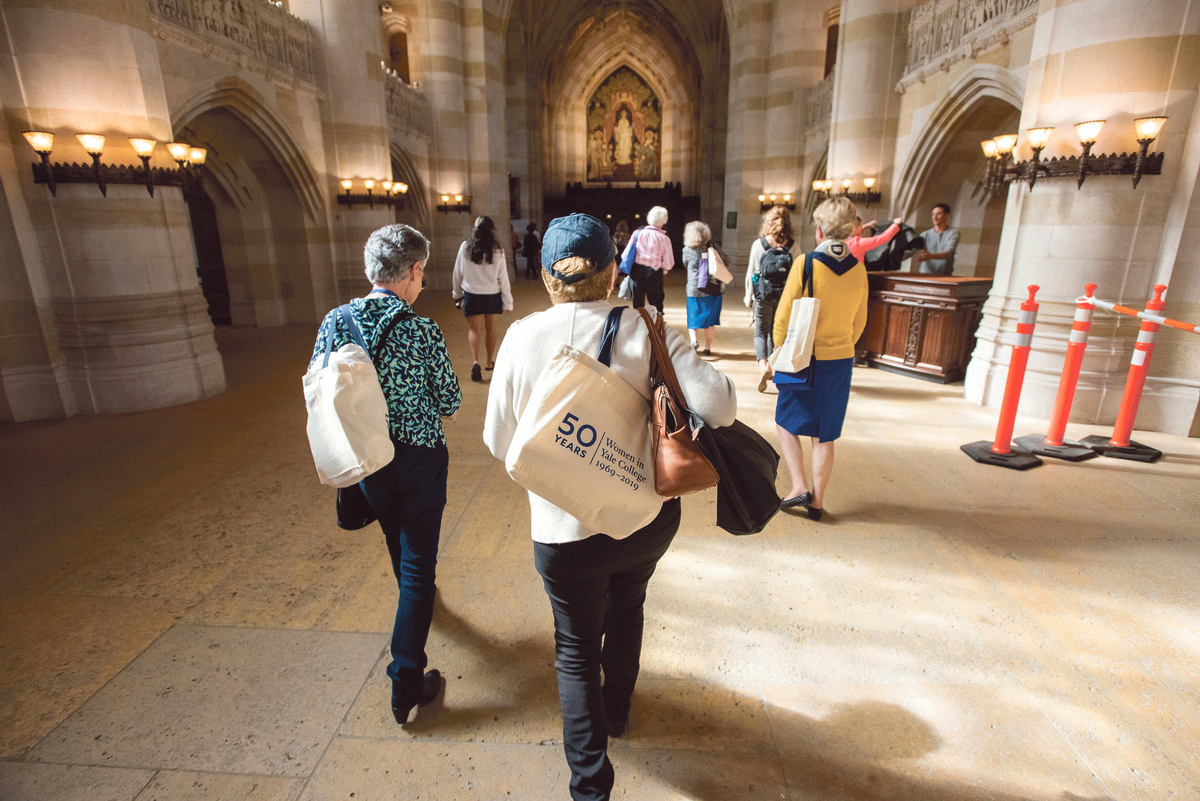After controversy, First Women Written History Project to include attribution, reinstate some content

Courtesy of Mara Lavitt
The First Women Written History Project — a collection of written testimonies from the “first women at Yale” cohort, who graduated in 1971, 1972 or 1973 — will now include named attributions, after 418 Yale affiliates signed a letter protesting the planned publication of an anonymous version of the project.
In early February, the project managers of the Written History Project were planning to publish two versions of the final book: a private one, which would include the names of the contributors unless anonymity was specifically requested, and a public one, which removed all of the authors’ names. On Feb. 19, members of the first women cohort sent the collective letter to the project team calling on them to reinstate the names of all authors in the public version unless an author requested otherwise.
Representatives from the petitioning coalition, the Yale Alumni Association and the Written History Project team held a meeting on March 12. Following the meeting, they decided that the project team would destroy all copies of the book with anonymized testimony and survey all contributors to the project about whether they would like their names included in the public version of the book. The single, public version — with names reinstated — will be distributed online and entered into the records in Sterling Memorial Library. The new version will also include parts of one woman’s testimony that were edited out in the previously planned public version.
“There was really this overwhelming show of support, because the classmates and others who we shared the letter with understood the importance of this,” Shelley Fisher Fishkin ’71 GRD ’74 GRD ’77, one of the response coordinators and co-authors of the petition, told the News. “It was very special and very gratifying to see even non-contributors say that names are important because they forge a link between who we were at Yale and the accomplished women that we’ve become, and that they felt that Yale should be celebrating us, not erasing us.”
In addition to Fishkin, Lydia Temoshok ’72, Dori Zaleznik ’71 and Connie Royster ’72 helped author the letter and coordinate all communications with the YAA and the Written History Project team. The letter ultimately included 418 signatures: 164 members of the first women cohort, including 73 contributors to the book; 180 male classmates from the classes of 1971, 1972 and 1973; and 74 additional men who were involved in coeducation, including former professors and members of the class of 1970.
In a joint email, the Written History Project team told the News that they believe the March 12 meeting resulted in a “good plan” that will satisfy all parties.
“In concert with the petition organizers and in light of a very productive meeting with them on March 12, 2021, we believe we have identified a path to satisfactorily resolve all outstanding issues,” the Written History Project team wrote in an email to the News. “Since the Written History Project began in 2018, alumni volunteers have devoted considerable time and effort to this project and continue to believe that recording, preserving, and now sharing the history of the first cohort of women in Yale College is an important undertaking.”
Barbara Wagner ’73 and Carol Whitehead ’72, the co-editors of the book, were present at the meeting, as well as Eve Hart Rice ’73, a member of the Yale Board of Trustees who was also involved in the project.
YAA director Weili Cheng ’77 helped facilitate the meeting and told News that the YAA is “pleased that concerns have been addressed.”
In addition to the reinstatement of the author’s names, the new versions of the book will undo edits to the testimony of Julia Preston ’76, who was originally a member of the class of 1973.
Upon originally submitting testimony beginning in September 2019, contributors signed a release that allowed for Yale to edit their testimony. Throughout the editing process, the co-editors of the book removed certain names from women’s testimonies.
Preston’s unedited testimony included an allegation that a professor, the late Kenneth Mills, once forcibly kissed her during a meeting in his apartment. Preston was clear in her testimony and in an interview with the News that the alleged incident had little effect on her time at Yale, and that she only recalled it years later when she read a 2017 report commissioned by the prep school Choate Rosemary Hall — where Mills had resided with his wife — that alleged a history of sexual misconduct by Mills in the late 1970s. Preston said she included her anecdote involving Mills not to levy a similar allegation against him but rather because after reading the Choate report, she realized that had she reported the incident when it happened to her, she might have prevented Mills from continuing such a pattern when he moved to Choate.
“Recalling this story made me realize what Yale women have done in recent years that we didn’t do,” Preston said. “During our time, there were so many other things going on, but what Yale women have done in recent years to force the University to really take this issue seriously, and to create, or at least begin to create effective mechanisms for reporting, and to highlight how damaging this conduct can be — my respect to those women. What they did was very important.”
In Preston’s original submission, she named both Mills and Choate; in their edits, the project team removed both names. Preston also mentioned Mills in a flattering light earlier in the testimony, when she wrote about the May Day rally and related racial protests in the spring of 1970, of which Mills was an integral part. In that part of her testimony, the project team left Mills’ name in.
Preston noticed the changes when she went back to read her own testimony following the anonymization controversy. She told the News that the changes upset her because of the inconsistency of Mills’ name’s inclusion and because of its implications for her story: Through their edits, the co-editors incorrectly implied to readers that the anonymous person was not Mills. Preston, a long-time journalist, said that the inconsistency with Mills’ anonymization did not align with journalistic standards.
By taking out the names of both Mills and Choate, Preston said, the co-editors diminished the purpose of the anecdote. Preston wrote to the co-editors on March 15 detailing that concern, as well as her concern about the inconsistency of Mills’ anonymization. She requested that Mills’ and Choate’s names be re-included in her testimony, and that her letter expressing her objections be included in the Sterling Library Archive alongside the testimony.
A week later, the project team informed Preston that they would make these changes in the new version of the book, as well as include the letter in the archive.
“The general editing guidelines around third party names remain in place,” the project team wrote in an email to the News. “Restoration in this particular essay was a special circumstance owing to an investigative report, commissioned by Choate that documented the behavior of the individual, which had already been posted to the internet and been made publicly available.”
The current timeline for the publication of the new book remains unclear, as the project team plans to survey all contributors to allow them an additional chance to request anonymity or to remove their narratives entirely in the new public version of the book.
Still, all parties interviewed told the News that they are pleased with the path forward.
“We have gotten back so many positive responses, so many people saying that this is such a good outcome,” Temoshok told the News. “It’s been really gratifying to receive these messages and see this work lead to such a positive resolution.”
Yale College first admitted women in 1969.
Amelia Davidson | amelia.davidson@yale.edu








